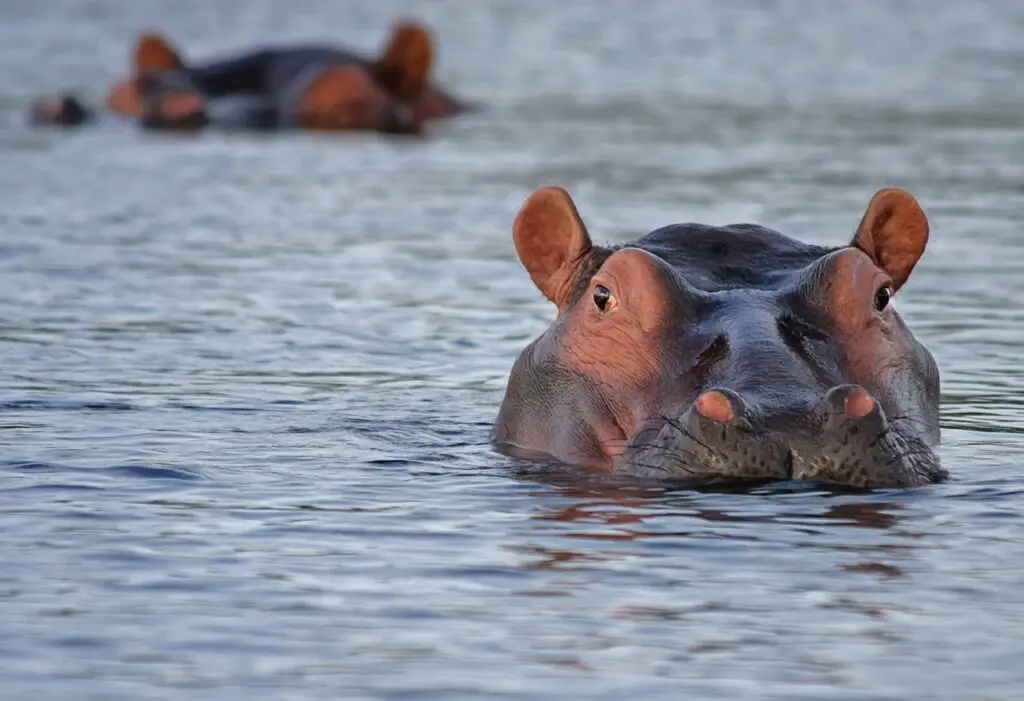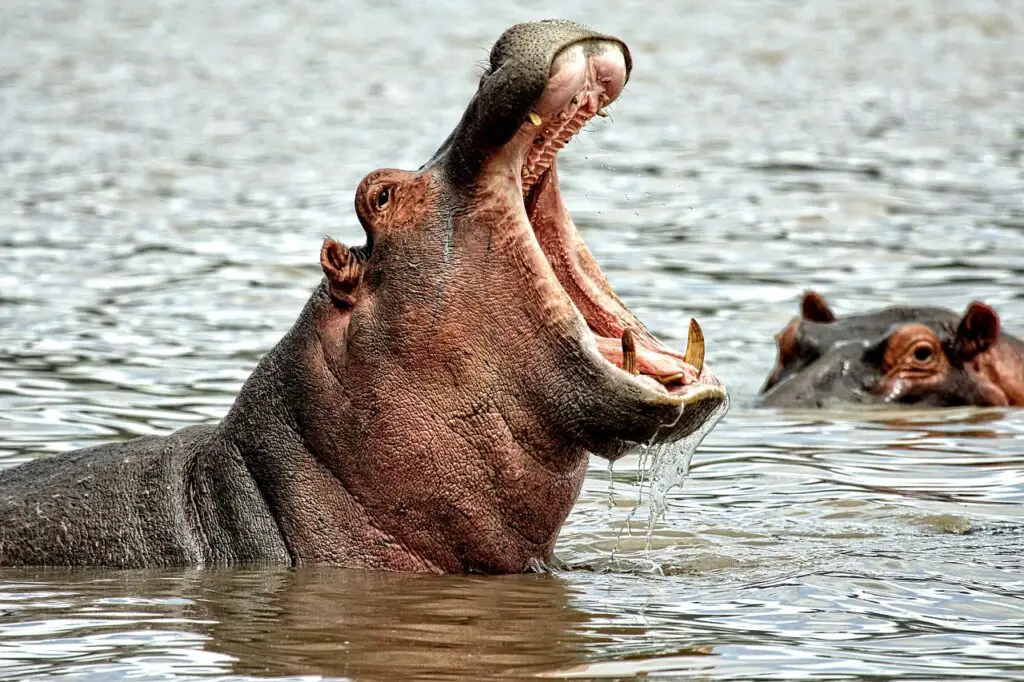How long can a Hippo stay underwater?
Hippos, scientifically known as Hippopotamus amphibius, are remarkable for their ability to remain submerged in water for extended periods of time. This is because they have a specialized respiratory system that allows them to conserve oxygen while underwater.
Hippos can reduce their oxygen consumption by suppressing their metabolic rate during submersion. This is accomplished through a combination of physiological adaptations, including a decrease in heart rate and blood flow redirection to vital organs such as the heart and brain.
Hippos can hold their breath for an average of 5-6 minutes while submerged, with some individuals capable of staying underwater for up to 8 minutes, according to research. This remarkable feat is made possible by their well-developed lungs, which can take in large volumes of air and store oxygen in their muscles and blood.
Hippos are also agile swimmers, able to move quickly through the water thanks to their powerful legs and webbed feet. They are territorial and can be aggressive to intruders, especially during the breeding season.
Overall, the hippopotamus is an enthralling creature with unique adaptations that allow it to thrive in its aquatic environment. Its ability to stay underwater for long periods of time is just one of many remarkable characteristics that make this animal a natural wonder.

So, Can hippos stay underwater for a long time?
Yes, hippos can stay underwater for an extended period of time. A hippo can hold its breath underwater for about 5-6 minutes on average, with some individuals capable of staying underwater for up to 8 minutes.
This extraordinary ability stems from their specialized respiratory system, which allows them to conserve oxygen while diving.
Hippos can suppress their metabolic rate during submersion to reduce oxygen consumption, and they can also store oxygen in their muscles and blood.
Hippos also have well-developed lungs that can take in large amounts of air. These adaptations allow hippos to stay underwater for extended periods of time, allowing them to live a semi-aquatic lifestyle.
How Long Can a Baby Hippo Hold Its Breath?
While there is no definitive answer, it is widely assumed that baby hippos can hold their breath for 30 seconds to one minute. Baby hippos, like adult hippos, have a specialised respiratory system that allows them to stay underwater for extended periods of time.
Baby hippos, on the other hand, are typically not as well-developed as adults, and they may lack the same level of muscle strength and lung capacity. As a result, they may be unable to hold their breath as long as adult hippos do.
Despite this, baby hippos are born with an instinctive ability to hold their breath underwater, and they have been observed swimming and diving with their mothers shortly after birth.
This is an important survival skill for them in their semi-aquatic habitats, where they may need to avoid predators or navigate through the water to reach food sources.
Overall, while baby hippos cannot hold their breath as long as adult hippos, they have impressive underwater abilities that allow them to thrive in their unique environments.
How Can Hippos Hold Their Breath for Such a Long Time?
Due to their unique respiratory system and adaptations that allow them to preserve oxygen while deep diving, hippos can hold their breath for such a long time.
First of all, hippopotamuses have well-developed lungs that have a big air intake capacity. This enables them to hold onto more oxygen before diving. In addition, when hippos dive below, they may seal off their nostrils and ears to keep water out of their airways.
Second, hippos have the ability to lower their metabolic rate to use less oxygen while submerged. In order to conserve energy and oxygen, they can therefore slow down their heart rate and other biological processes.
Thirdly, the muscles and blood of hippos have the capacity to store oxygen. Myoglobin, a protein that stores oxygen in muscle tissue, is highly prevalent in them. This enables them to use the oxygen that has been saved over extended dives when their lungs are exhausted.
Finally, hippos have developed a diving reflex in order to adapt to their semi-aquatic existence. The body naturally slows down its heart rate and directs blood flow to essential organs, such as the heart and brain, as a result of this reaction, which is triggered when the face is submerged in water. This increases their diving time and helps preserve oxygen.
In conclusion, hippos’ highly developed lungs, capacity to control their metabolic rate, ability to store oxygen in their muscles and blood, and diving reflex allow them to hold their breath for such a long time. Hippos have evolved to flourish in semi-aquatic areas and endure harsh conditions where they must dive and swim to fend off predators, seek food supplies, or control their body temperature.
Why do Hippos sleep underwater?
Although hippos do not sleep underwater, they do spend a significant amount of time submerged in water.
Hippos are semi-aquatic animals that spend much of their time in or near water to stay cool and hydrated. They can spend up to 16 hours per day in the water, standing or lying down.
While hippos do sleep in water, they do not fully sleep because they must surface to breathe on a regular basis. When hippos sleep, they often do so in a low alert state, with their eyes and ears open to monitor their surroundings.
Hippos also use water to escape the harsh sun during the day and to shield themselves from predators. They can lessen their danger of overheating and dehydration by remaining in the water, which is essential for their survival in their semi-aquatic habitats.

How long can Hippos hold their breath while sleeping?
Hippos have been observed to breathe underwater when dozing. Hippos can hold their breath when sleeping for an undetermined amount of time, however, it is generally accepted that they can do so for at least five minutes.
This is so that when hippos sleep, they are in a relaxed state and use less oxygen and their metabolic rate. In contrast to when they are active, this enables them to preserve oxygen and hold their breath for extended periods of time.
Hippos have also developed a variety of physiological adaptations that enable them to spend a long time underwater due to their semi-aquatic lifestyle.
They have a unique respiratory system, the capacity to store oxygen in their blood and muscles, and a diving reflex that aids in oxygen conservation, as was previously noted.
It is vital to remember that hippos can get in danger if they hold their breath for an extended period of time. They may experience oxygen deprivation, which can result in brain damage or even death if they hold their breath for an excessive amount of time or are deprived of oxygen for a protracted length of time.
Hippos can hold their breath for long periods of time, but in order to prevent suffocation or oxygen deprivation, they must periodically emerge to take in the fresh air.
Hippos’ ability to survive underwater is greatly influenced by both their behaviour and the physiological modifications that allow them to hold their breath for long periods of time. In order to conserve oxygen and energy, hippos are known to slow down their pulse rates and limit their movements when submerged.
Hippos frequently position themselves in a way that makes it simple for them to surface for a breath of fresh air. For instance, they might snooze with their heads and nostrils above the water’s surface so they can breathe.
It’s also important to remember that while underwater, hippopotamuses are not fully still. By holding their breath, they can move their limbs and even swim a short distance. This facilitates their movement across their aquatic environments and allows them to flee from predators.
Despite the fact that hippos can hold their breath for long periods of time while sleeping, they nevertheless need to rise to the surface frequently to breathe in fresh air to prevent oxygen starvation or suffocation.
In their semi-aquatic habitats, the adaptations and habits that enable them to remain underwater for extended periods of time have been essential to their survival and success as a species.
Is Hippo a lazy animal?
Because they spend a lot of time sleeping and resting during the day, hippos are frequently thought of as lazy animals. Although it is crucial for their existence, this behaviour is a natural adaptation to their semi-aquatic lifestyle.
Hippos may seem lethargic, but when they leave the water at night to graze on grass and other vegetation, they are actually highly active. They are known to be extremely territorial and hostile towards intruders, and they have been known to travel up to 10 kilometres in a single night.
Hippos can swim well and swim swiftly, which allows them to move quickly through the water. They can also run quickly on land when they feel threatened.
As a result, while hippos may appear to be lazy during the day, they are actually very active and formidable animals with a variety of adaptations that allow them to thrive in their semi-aquatic habitats.
Hippos are well-known for their sociable behaviour in addition to their nocturnal feeding habits and their skill in both running and swimming. They assemble in packs of up to 30 members, with a dominant male in charge.
The males aggressively defend their territories against any potential intruders, including other hippos, crocodiles, and even people.
The speech patterns that hippos make are extremely well known; they utilise them to talk to one another.
Long distances can be covered by these vocalisations, which range from grunts and snorts to growls and roars. Also, they have a reputation for ritualised aggressive behaviours including charging at each other and growling.
Despite their enormous size and strength, hippos are considered endangered due to habitat loss and hunting.
The International Union for Conservation of Nature (IUCN) has classified them as “vulnerable,” with estimates indicating that their population has declined by up to 20% in the last decade.
Efforts are underway to protect and conserve hippo populations, including the establishment of protected areas and conservation programmes aimed at reducing human-hippo conflicts.
We can ensure that these unique and fascinating animals thrive for future generations by protecting them.
